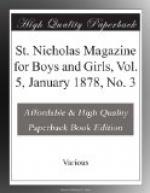[Illustration: THE ENEMY.]
But I pity the charity-school girls. Although always neatly and cleanly dressed, they are all alike, with white caps, and dresses which might have been cut from the same piece. They file through the streets or public gardens, under the charge of the “good sisters,” and perhaps they stop to play or rest sometimes, but I never saw them do so. Perhaps there is no real reason to pity these charity-children, boys or girls; but I remember my own free and happy school-days in America, and so I pity them.
[Illustration]
THE PETERKINS ARE OBLIGED TO MOVE.
BY LUCRETIA P. HALE.
Agamemnon had long felt it an impropriety to live in a house that was called a “semi-detached” house, when there was no other “semi” to it. It had always remained wholly detached as the owner had never built the other half. Mrs. Peterkin felt this was not a sufficient reason for undertaking the terrible process of a move to another house, when they were fully satisfied with the one they were in.
But a more powerful reason forced them to go. The track of a new railroad had to be carried directly through the place, and a station was to be built on that very spot.
Mrs. Peterkin so much dreaded moving that she questioned whether they could not continue to live in the upper part of the house and give up the lower part to the station. They could then dine at the restaurant, and it would be very convenient about traveling, as there would be no danger of missing the train, if one were sure of the direction.
But when the track was actually laid by the side of the house, and the steam-engine of the construction train puffed and screamed under the dining-room windows, and the engineer calmly looked in to see what the family had for dinner, she felt indeed that they must move.
But where should they go? It was difficult to find a house that satisfied the whole family. One was too far off, and looked into a tan-pit, another was too much in the middle of the town, next door to a machine shop. Elizabeth Eliza wanted a porch covered with vines, that should face the sunset, while Mr. Peterkin thought it would not be convenient to sit there looking toward the west in the late afternoon, (which was his only leisure time) for the sun would shine in his face. The little boys wanted a house with a great many doors, so that they could go in and out often. But Mr. Peterkin did not like so much slamming, and felt there was more danger of burglars with so many doors. Agamemnon wanted an observatory, and Solomon John a shed for a workshop. If he could have carpenters’ tools and a work-bench, he could build an observatory, if it were wanted.




